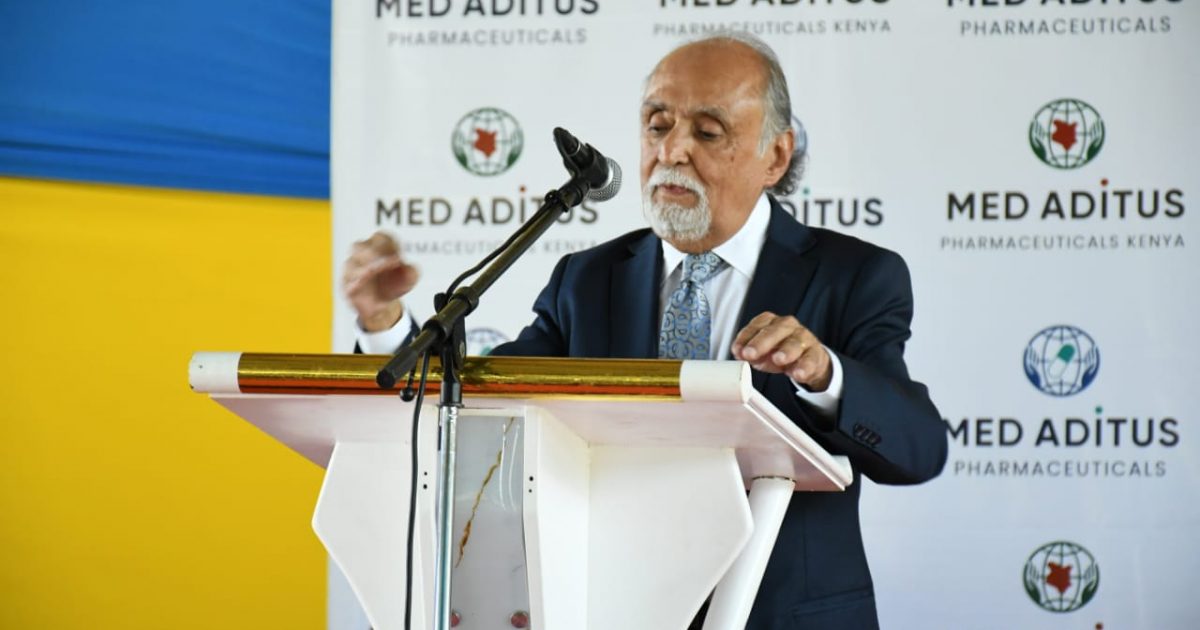Kisumu County has partnered with Med Aditus Pharmaceuticals (MAP) to establish a Sh1.6 billion pharmaceutical manufacturing plant, aimed at producing high-quality, affordable medicines.
The US-based company is set to use advanced technology to optimize the operations of the facility, which will be located on a 10-acre site in Miwani Ward, Muhoroni Sub County.
Production is slated to begin in 2028, targeting medicine distribution within Kenya and the broader East African region to address pressing healthcare needs.
Prof. Dhiren Thakker, CEO of MAP, said that the initiative is designed to bolster Kenya’s pharmaceutical production capabilities and reduce reliance on imported drugs.
“Our new facility in Kenya will help fulfill our mission of improving access to affordable, high-quality medicines in sub-Saharan Africa and fostering the growth of local pharmaceutical production,” said Prof. Thakker.
He emphasized that limited access to quality medicines remains a significant issue in Africa, contributing to poor health outcomes.
In Africa, there are less than 400 drug manufacturing firms that serve approximately 1.5 people, compared to India’s 10,500 companies for a similar population size, underscoring Africa’s heavy dependence on imports.
Prof. Thakker noted that modern medicine has significantly improved life expectancy in wealthier nations and called for equitable drug access campaigns in low-income regions.
Modern medicine, he added, has proven to have increased life expectancy especially in wealthy countries and low income nations deserve equality in quality drugs access and affordability.
“Studies show that access to quality medicine guarantees extended life expectancy by 10 to 20 years in Western countries, hence, bridging this gap in low-income areas is essential,” Prof. Dhiren remarked.
The Kisumu plant will deploy latest technologies including continuous modular manufacturing and blockchain-powered quality management system to meet the patient and market needs. These technologies, a first-of-its-kind in the Sub-Saharan Africa, will enable MAK to produce highest quality medicines in large quantities at lower cost.
Leveraging advanced technology, the factory will have tablet production capacity of between 2-3 billion tablets in a year with a production rate of about 5-10 minutes per unit compared to the traditional production methods 2-3-month timeline.
In a groundbreaking step towards medical innovation, MAK is investing in advanced technology-driven patient centered solutions expected to revolutionize treatments for various conditions by potentially replacing traditional drug therapies.
The Kisumu plant plans to produce cutting-edge treatments for HIV, Tuberculosis, Malaria and various antibiotic needs alongside medications for cancer, sickle cell disease, cardiovascular conditions, and diabetes to combat the region’s growing disease burden.
The project taskforce Chairperson, Dr. Vincent Orinda said hosting the plant is a significant milestone that positions Kisumu County as a competitive player in global healthcare markets as well as provide job opportunities for the locals.
Med Aditus identified Kenya, particularly Kisumu County as its preferred location to establish the pioneering venture after an intensive, critical evaluation of various places across Sub-Saharan Africa.
Kisumu became a finalist topping its greatest competitors Senegal and Rwanda that had also shown great potential to host the firm.
Ken Onditi, Nyanza Regional Director of the Kenya National Chamber of Commerce and Industry, lauded the project’s potential economic impact, emphasizing that it would promote a healthier population capable of contributing actively to economic activities.
“The new drugs manufacturer assures improved healthcare outcomes thus, ensuring the wellbeing of the citizens who can actively engage in various economic activities,” Onditi said.
The foreign investment, he added, would also facilitate technology transfer, enhancing professional expertise in the healthcare sector.
By Robert Ojwang’




